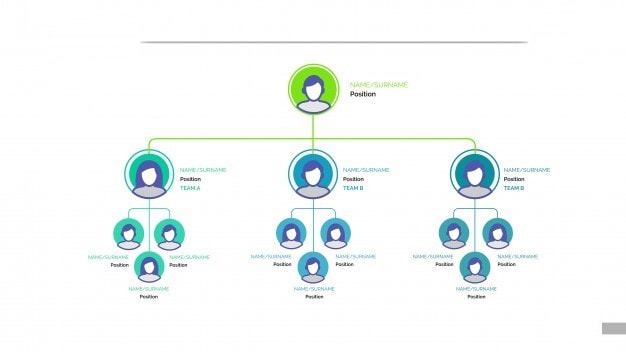Definition:
The informal organization is defined as a network of social and personal relationships that occur in a work environment. It is a fact that an informal organization co-exists with a formal one and generally emerges because of default. Although formal principles do not bound these, they are still considered an integral part of formal organization.
Table of Contents
Characteristics
The characteristics of an informal organization are as follows-
- An informal organization is created based on common culture, religion, language, issues, taste etc.
- The informal organization is influenced by likes, dislikes, emotions and whims of the people
- It is flexible, unplanned and created without the approval of an authority figure
- An informal organization is easily understood and explained
- Formation of an informal organization is a natural process that is not based on any rules and procedures
- In an informal organization, there is no set or defined relationship; it is often spontaneous
- At last two or more than two people can create an informal organization
- Membership is voluntary in an informal organization
- It is possible to join more than one informal group at a time
- The informal organization excels at an alignment
- The informal organization helps to deal with consistent situations
Functions of informal organization
The primary functions of an Informal organization are as follows-
- Spread the social and cultural values – The members of an informal organization hold specific common values as close to their hearts. Daily interactions give credence to these values and help to preserve the integrity and unity of the group members. Individuals in an informal organization can talk freely share secrets, joke around, have a meal in a friendly environment, and support unconditionally without being judgemental. This boosts a feeling of worth that increases self-satisfaction and personal esteem. The function of an informal organization is to spread the cultural and social values and bind all its members with a common thread. These values can provide a social status and immense satisfaction to its members that they are unable to achieve on their own in the formal organization.
- Offer social control – The function of an informal organization is to provide social control by regulating and influencing behaviour that exists within the group as well as outside the organization.
- Promotes communication – The function of an informal organization is to develop a secure communication channel that works much faster than those of their counterpart, the formal organization. It keeps all the members informed via an effective system about the actions of the management or any other important news. It is seen that managers sometimes use the informal organization’s communication channel to spread or convey specific information to their employees in an informal manner
Features of informal organization
The features of the informal organization are as follows-
- Unplanned structure – The informal organization structure is not pre-planned as it arises out of formal interaction by itself. Individuals discuss beliefs, attitudes and interest and develop objectives and goals that are quite different from that of formal organization. This informal relationship creates an informal organization. This is why it is often said that both the formal and informal organization exist side-by-side just like the two sides of the same coin
- No formal structure – Another feature of the informal organization is that it does not have a definite or a formal structure and cannot be shown in the organizational chart. Interests and likings change, and this changes the equation in the relationships. There are no lower or higher level authority figures, and people can communicate in diagonal, horizontal and vertical form.
- Informal communication – An informal organization has an open communication system which does not adhere to a chain of command. Its essential feature is that although it operates side-by-side of formal channels, it is way fast than it in terms of spreading news and gathering information. The flow of communication can spread throughout the organization in every direction diagonal, vertical and horizontal and connect like-minded people
- Social needs – Another feature of an informal organization is to fulfil the personal and social needs of the people. They share common thoughts and feelings, and their social and individual need of love and friendship is given credence in the informal organization
- Informal leaders – The election of leaders is an informal process conducted by the members. They yield a strong influence on group activities and have a say in the formal goals which can be either positive or negative, depending upon the circumstances
- No fixed tenure – One of the significant features of an informal organization is that its tenure is not fixed. It came into existence because the people demanded it and can be dissolved because of the wish of the people. An important fact is that it does not need any legal procedure hence can be terminated at the drop of a hat
- The outlook is essential – In an informal organization, people tend to interact with people with whom they share a comfortable bond and can relate. Functions, ranks and responsibilities do not have any relevance but what is essential is personal attitudes and prejudice. A necessary feature of the informal organization is that religious, cultural, political and social outlook plays a vital role in this type of groups
- No rules and regulation – The informal organization does not have a specific set of rules and regulations in place to give directions to its members as they can be easily changed as per the circumstances at any given time.
- Cannot prohibit the existence o informal organization – Managers cannot prevent the existence or formation of an informal organization. The only thing that they can do about it is to regulate them. Even the regulation of an informal organization is significant as it can have an impact on the morale and productivity of the involved individuals.
Here is a video by Marketing91 on Informal Organization.
Advantages
The advantages of the informal organization are as follows-
- Fulfils social needs – An informal organization can meet the social needs of the employees in a firm because it encourages a feeling of belonging. It takes into account the values and sentiments to integrate every member in its fold
- Faster communication – An informal organization has a fast and quick communication channel that can spread any news within a short period
- Efficient work system – informal organizations blend beautifully with formal ones to make the system more efficient. An informal relation is flexible and spontaneous, and this is why it can meet the problems head-on that formal organizations are unable to. This creates a dynamic situation where the work system is better and effective
- Enhanced productivity – An informal organization has a positive influence that leads to a boost in productivity
- Improved management practice – One of the benefits of informal organizations is that it pushes the managers to organize, control and plan professionally. This results in improved management practice
- Fulfils organizational objectives – The informal organization can compensate for the limitations that occur because of formal structure and is thus able to fulfil organizational objectives successfully
- Job satisfaction – An informal organization provides emotional security to the workers. The sense of being there and belonging in a warm space helps in job satisfaction. This reduces employee turnover and boosts employee retention.
- Lightens the workload of management – When the management has confidence in the informal organization, they become flexible and are ready to delegate. They also do not have to micromanage every activity, and this ultimately lightens the workload of the management
- Fills the gap in management abilities – If the informal organization has any doubts about the manager’s skill, then it becomes ready to fill in the gaps. In case he is weak in management, then the members of the informal group will offer viable suggestions in correcting his defective plans.
- Safety valves – Informal organization is considered a safety valve for emotional outbursts and frustrations as the members get the opportunity to share and discuss their dilemma and issues in a friendly setting
- Careful planning – Managers are aware that members of the informal organization will keep a check on its activities, and this is why it makes careful plans after going through its pros and cons. They do not try to misuse their powers and create absurd actions and policies that will prove harmful for the organization
Disadvantages
The disadvantages of the informal organization are as follows-
- Resistance to change – It becomes impossible to bring changes in a firm if the informal organization is not in its favour. It ultimately restricts the growth of that firm and slows down the progress
- Lack of specialization – Another disadvantage of the informal organization is that the work is based on mutual relationship and not on division of labour and this is why there is a lack of specialization in such organizations
- Creates rumours – It is seen that informal organization often participates in spreading rumours that can be against the interest of the company. These rumours are often inaccurate, distorted and destructive that spreads incorrect information amongst the members and leads to hostility, anxiety and confusion.
- Causes insubordination – An informal organization often encourages employees to act against organizational procedures and policies. This restricts output, promotes unauthorized action and causes insubordination.
- Roadblock for competent people – An informal organization makes employees reluctant, and they do not wish to act independently or creatively. This is because they fear to lose the approval of the group. This is a roadblock for the people who are competent as others will not let them find their way in the maze
- High operating costs – Informal organization encourages idle conversation and joke-telling amongst the members that means wastage of time and high operating costs.
- Poor motivation – Informal organization has a weak satisfaction level, and this is why it has a poor motivation point. Competent people cannot find actual job satisfaction in this environment
- Source of conflict – An informal organization is often considered by many as a source of conflict within the company
- Leads to conflicts – An informal organization leads to inter-group and interpersonal conflicts and hinders the organizational work
- Managers are unable to exercise control – As formal rules do not bind the employees, they are not obliged to abide by the order of a manager. Thus it proves a disadvantage for the manager as he is unable to exercise proper control
- Role conflict – Informal organization develops and encourages role conflict and negative attitude within the organizational structure.
- Emphasis on individual interest – Informal organization is all about individual satisfaction and interest and not about the interest and welfare of the company.
Liked this post? Check out the complete series on Organizational Management



